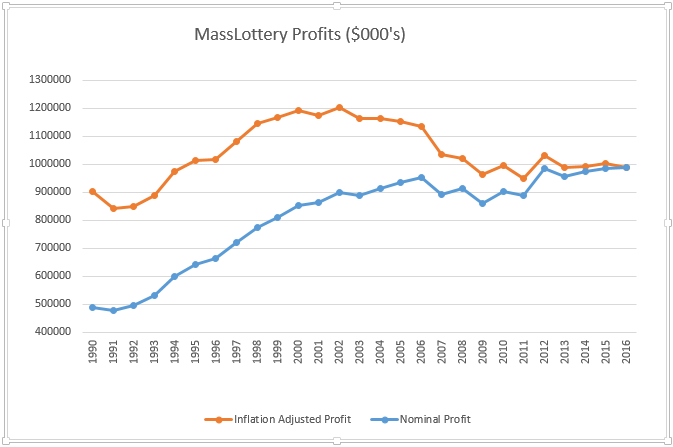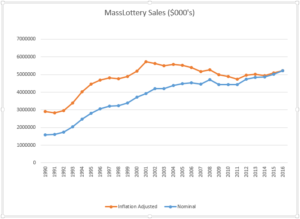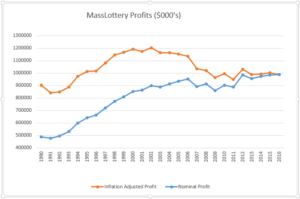Why Mass Lottery’s performance is not nearly as impressive as it seems
Over the last 5 years, the Massachusetts State Lottery and the media have made a tradition out of announcing the Lottery’s “record-breaking” sales. Here are articles – from 2016, 2015, 2014, 2013, and 2012 – that display this trend.
But is this an accurate portrayal of the institution’s success? Is the Lottery actually growing, in the long-run, at such a steady pace?
The Lottery’s sales – in nominal terms – have reached a new record each year for the past five years. This matches with its long-term trend of unmitigated growth for the better part of three decades. Pioneer Institute, through a public records request, received the Lottery’s financial reports for 1990 – 2010 (the reports for 2011 – 2016 are available online). These reports show a 230% growth in sales and a 100% growth in profit from 1990 to 2016.
But when the media lauds the Lottery for its now annual tradition of breaking records, it’s speaking in terms of nominal dollars – in other words, the value of a dollar in the current year not adjusted for inflation. This is fine for denoting yearly sales. But it’s not a reflective measure of performance when comparing annual sales and profits over a long period of time. This is because inflation causes nominal dollar amounts to increase automatically over time. So, even if the Lottery fails to sell as many tickets in 2017 as it did in 2016, it could still break the 2016 nominal sales record because of general price inflation.
Indeed, when we adjust the Lottery’s numbers for inflation using the Bureau of Labor Statistics’ online CPI Inflation Calculator, a different picture emerges (illustrated in the graphs below). Rather than sustained profit growth and yearly sales records, we see a downward trend in sales and profits since the early 2000s. The last time the Lottery broke a sales record, adjusted for inflation, was 2001.
Based on these adjustments, we see a sustained period of growth for the Massachusetts Lottery throughout the 90s and into the early 2000s. But starting from 2003, profits enter a slow decline before going into freefall during the 2008 financial collapse. Coming to the present, we see a couple scattered years of growth (2010 and 2012) before 4 years of stagnation.
From 1995 – 2008, the Lottery exceeded profits of $1 billion every single year when measured in 2016 dollars. The peak of this is 2002, when the Lottery made upwards of $1.2 billion. And yet, since 2009, the Lottery has cleared the billion dollar threshold (once again, measured in 2016 dollars) just two times. 2016’s “record-breaking profit” was just $986.9 million – the 8th worst year since 1990.
For the last five supposedly record-setting years, the Lottery has not come close to breaking the inflation-adjusted sales record. This year’s $5.231 billion in sales is nearly $500 million short of 2001’s inflation-adjusted $5.725 billion.
These numbers are by no means a cause for panic. The Lottery is still raking in enormous sums – it is, undoubtedly, a hugely profitable institution. But the mainstream narrative surrounding the Massachusetts State Lottery must be reexamined. The Lottery has been cognizant of impending profit declines due to the rise of the casino industry, but declines may already be here. They may, in fact, have been here for years.
The cause of the Lottery’s underwhelming numbers could be any number of factors. It may be that less people are gambling in general. It may be due to Massachusetts’ hesitancy to implement an online lottery. It may, as I pointed out in a previous blog post, stem from increased prize payouts.
What is certain is that this trend – of underwhelming inflation-adjusted profits – is one worth looking into.
To be fair, the Lottery has voiced concerns about current profit stagnation. But these concerns seem to have fallen on deaf ears in light of the Lottery’s yearly coronation as a record-breaking institution. This narrative may prove to be true; the Lottery may be in great shape. But a quick look at the numbers suggests otherwise – and a much harder look is warranted.





